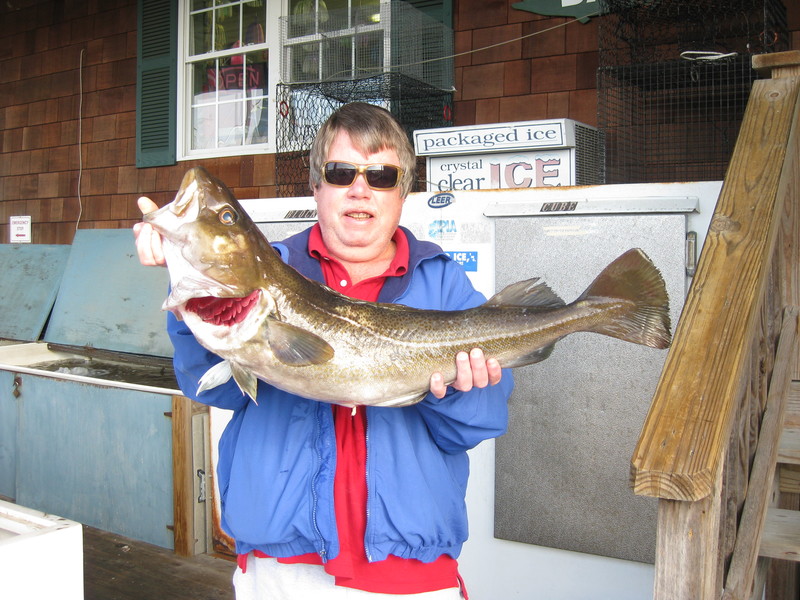Many fishermen coming home with empty boxes
Fishing for rock has slowed down at the mouth of the bay. While some boats have caught a few keepers, many have come home with empty boxes. Last Friday, Mike Pizzolato and I ran his boat down from Slaughter Beach stopping at Brown Shoal on the way. We tried trolling Stretch 25 plugs and drifting eels there and at the Eights, the Valley and Overfalls Shoal. Other than a few dog sharks on the eels, we had nothing.
Tog fishing has improved even as rockfishing declined. Good numbers of tog have been caught on bay reef sites and at the Outer Wall and the Ice Breakers. As always, crab is the top bait.
Reports from central New Jersey continue to tell of large numbers of rockfish caught on anything that resembles a sand eel. The action is primarily from boats, but surf casters get in on the bite when they are in the right place at the right time. Surf casters and jetty fishermen in Delaware are still waiting.
When the weather allows boats to make the long run into the ocean, they are returning with a mixed bag of sea bass, tog and cod. Inshore boats are collecting decent numbers of tog on wrecks and reefs.
New National Marine Fisheries Service report
The National Marine Fisheries Service has released a Saltwater Recreational Fishing Action Agenda in an effort to include recreational fishing interests in the decision-making process when it comes to regulating marine fisheries. NMFS through a series of councils has the job of maintaining a healthy fishery along the American coast. You might ask, ”Hasn’t the agency always taken into consideration the interests of recreational fishermen?”
The short answer is no. NMFS began life as the Bureau of Commercial Fisheries in the Department of Commerce. It is still in Commerce under the National Oceanic and Atmospheric Administration. Efforts to move NMFS to the Department of the Interior under the Fish and Wildlife Division have failed miserably because of opposition from the commercial fishing lobby.
I have served on various advisory committees answering to both state and federal agencies since 1975, and I can tell you from that experience, the commercial fishing lobby controls the decisions at the federal level and in both Maryland and Virginia, they control decisions on the local level as well. Delaware has had a good working relationship with commercial and recreational fishermen for many years. Be thankful for that.
In 2010, NMFS appointed Eric Schwaab as administrator for recreational fishing. This is a new office, and it is from this office that the new action agenda was created. For the first time in a hundred years, saltwater recreational fishermen will be recognized as an entity on the federal level.
One very interesting agenda item is the study of commercial and recreational conflicts at artificial reef sites off the coast of Delaware. All artificial reef sites are paid for with money from the federal excise tax on fishing equipment and therefore should not be used by commercial fishing interests. Delaware has recognized this and prohibited commercial gear on our reef sites. Efforts to do the same on the federal level, led by our own Jeff Tinsman, have not worked out to date. The new agenda requires a study that should validate the recreational fishermen’s claim of exclusive use of an area paid for with recreational fishermen’s money.
The very bad Marine Recreational Fisheries Statistical Survey used to count the number of fish caught by recreational fishermen has been on the way out for two years, yet it is still in use. The agenda calls for the implementation of the new system using the FIN numbers required by all states. It also calls for electronic reporting of catch reports from charter and head boats. This will eliminate the paperwork currently required.
There is a socioeconomic element in the agenda that will examine the effect of recreational fishing on the local economy. We have been saying for years that recreational fishing is much more valuable to the economy than commercial fishing, but without a full-fledged government study with peer review, our claims were without merit. This is not to say that commercial fishing should be put of business for the sake of recreational fishing. We simply want to be taken seriously rather than as a bunch of sports out for a good time with no meaningful purpose.
It will be interesting to see where the agenda leads. This is the first positive move to include saltwater recreational fishing interests on a national level since fishing regulations were instituted.
If you want to read the entire agenda, it is available at www.nmfs.noaa.gov/stories/2011/12/recfish.html.





















































